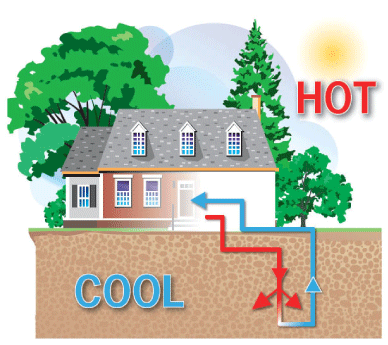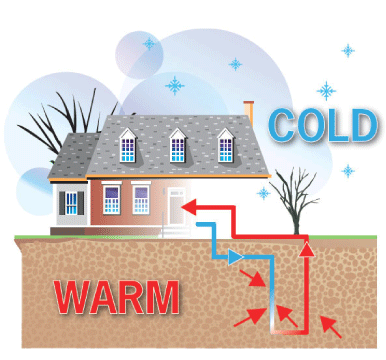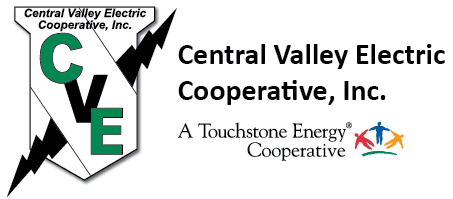When it's time to replace your heating and air conditioning system, or if you are building a new home - GEOTHERMAL IS THE WAY TO GO!
CVE wants to make it worth your while with huge rebates. There are also state and federal tax credits available. After you consider all the incentives, geothermal may cost about the same (if not less) as any other system you might be considering. But the best part of a geothermal system, and why so many people are installing them, is the SAVINGS! Homeowners that change to a geothermal heat pump save about 30% to 50% on their energy costs.
A geothermal heat pump is a lot like the heat pumps that many of us have at our homes now, but geothermal heat pumps use the constant temperature of the ground to heat and cool instead of the outside air like air-source systems. Geothermal (or ground-source) heat pumps are just a better way to heat and cool your home. They work like other heating and cooling systems with thermostats and fans, but they do not need natural gas or propane, plus they are very quiet and are extremely reliable. They can be used on any size home and can replace any type of unit that a home may currently have. It actually works by pairing the heating and cooling system with a series of ground loops that extend down into the earth. The earth has a nice, stable temperature and provides a way to keep the home comfortable throughout the year. Because of the energy it gets from the earth it uses about 40-60% less energy than a conventional system. Geothermal heat pumps are the most cost effective, energy efficient way to heat and cool a home.

During the summer, geothermal heating and cooling systems absorb heat from your home and transfers it to the underground loop where it is then absorbed by the cooler earth. The geothermal heat pump uses the cool water returning from the ground to create cool, dehumidified air conditioning for your home. When you need cooling the most, the outside air is hottest. A traditional air source heat pump must work hard to force the heat from your home into the already heat saturated air. In contrast, a geothermal heat pump consumes less energy as it easily rejects heat into the cool earth, making geothermal cooling significantly more energy efficient.

During the winter, geothermal heating and cooling systems absorb heat stored in the ground through the water that circulates in the underground closed loop system. This heat is carried to the ground source heat pumps where it is concentrated and then sent as warm, comfortable air throughout your home. When you need heating the most, the air outside is coldest. As a result, a traditional air source heat pump works hard to extract the amount of heat from the cold air needed to properly heat your home. In contrast, a geothermal heat pump system consumes less energy as it easily absorbs ground heat from the abundant supply stored below your home, making geothermal heating significantly more energy efficient. Gas furnaces burn natural gas or expensive propane to provide heat for your home and are only up to 98% efficient, while geothermal systems use less energy collecting heat from the earth, achieving 400-600% efficiencies.
Heating and cooling is typically the number one energy consumer in homes and buildings. CVE wants to make it easier for you to be able to install energy efficient heating and cooling units when constructing new buildings or remodeling existing buildings.
CVE offers a rebate of $2,500 per ton for ground source systems meeting the minimum efficiency requirements of 15.9 or higher EER and a 3.3 or higher COP. Please call before installation to ensure the system qualifies for the rebate.
"Tons" are the unit by which heating and air conditioning systems are sized and measured. Your qualified installer will do a Manual J Calculation to determine the exact amount of tone your home needs.
Rebate Example: A 4 ton unit (that meets the efficiency requirements) will get a rebate of $2,500 per ton for a total of $10,000. This means the CVE member would receive a check for $10,000 from Central Valley Electric Cooperative after the system has been installed and the rebate application has been processed.
Tax Credit
In addition to CVE's rebates, there could be tax credits available for qualified ground source heat pumps.
Consult with a tax professional to see if tax credits are available.





